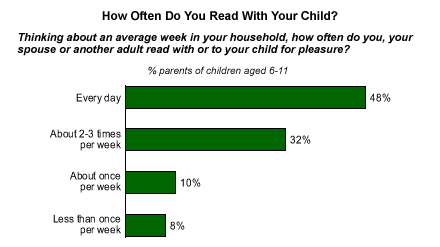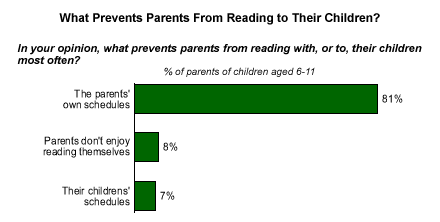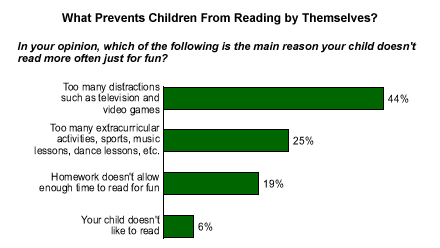The lucky among us have warm childhood memories of curling up with Mom or Dad and listening to them read stories about cats, hats, and amazing adventures. Little did we realize that our parents were helping us learn to talk, building our vocabularies, and priming us for the next big step -- learning to read. But even once children learn to read, parents still find great value in reading to, or with, them.
According to a recent Gallup survey* conducted for Hormel Kid's Kitchen Reading Club™ with parents of children aged 6 to 11, nearly all are united on the importance of reading with their children. The vast majority, 95%, agrees that reading to, or with, children is "very important."
Indeed, 81% of parents say they read to, or with, their children at least two or three times every week, and 48% say they read with them every day. Although these figures are not surprising, it is noteworthy that 70% of parents say they would like to be able to read with their children even more often than they do now.

Much has been written about the hectic schedules of today's children, who seem to be on the go from dawn until dusk, and often later. But parents of children aged 6 to 11 are likely to say their children's schedules are not what prevents them from curling up to read together.
Eighty-one percent of parents cite parents' schedules as the principal reason why parents don't have time to read to their children. In the third edition (2001) of his 1981 book on the topic of preserving childhood, The Hurried Child: Growing Up Too Fast Too Soon, David Elkind recognizes a parent's dilemma. "The contemporary parent," Elkind notes, "dwells in a pressure-cooker of competing demands, transitions, role changes, personal and professional uncertainties, over which he or she exerts slight direction. We seek release from stress whenever we can, and usually the one sure ambit of our control is the home."

Of course, young children have their own busy lives to keep up with. Even though 88% of parents told Gallup that their child likes to read, just 27% say their child spends one to three hours per day reading for fun -- compared to 75% who say their child spends one to three hours each day watching television or playing video games. When Gallup asked parents what they thought was the main reason their child doesn't read more often just for fun, those activities were mentioned most.

Bottom Line
It's summertime, and while the livin' may not be easy, it is a less stressful time of year for many parents and kids, and an excellent time for parents to keep those resolutions to read more with their children. Extra reading time may be particularly valuable because parents report that their children read for pleasure less often during the summer months than they do during the time when school is actually in session -- 29% in the summer months compared to 63% during the school year.
*Findings are based on telephone interviews with a random sample of 607 parents of children aged 6 to 11, conducted between March 9 and April 12, 2003. For results based on samples of this size, one cans say with 95% confidence that the error attributable to sampling and other random effects could be ±5 percentage points.